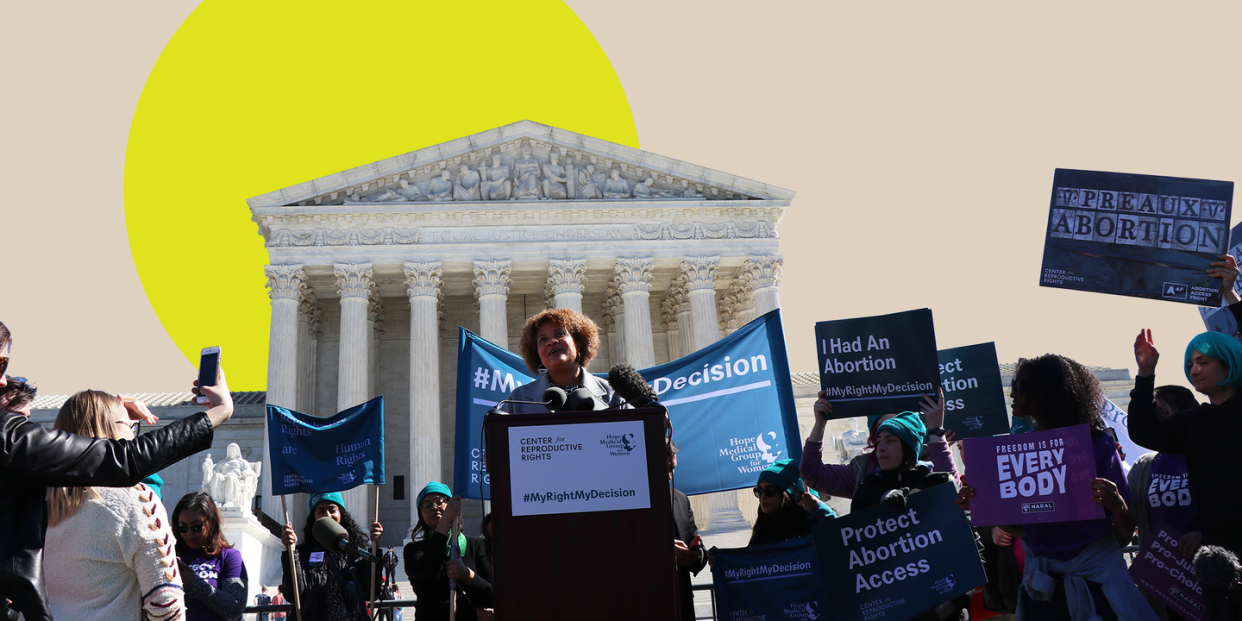Yesterday’s SCOTUS Abortion Ruling Is Nice, but It Shouldn’t Even Be Happening


Yesterday, the Supreme Court struck down a Louisiana law that would have made abortion care virtually inaccessible in the state. The decision is no small deal: It’s an increasingly rare triumph of putting precedent over politics while extremists target access to abortion daily.
But why are we still in the position of debating basic reproductive freedoms when these rights are ingrained in our constitution? The infuriating truth is that we shouldn’t even be having this conversation. The Supreme Court secured the constitutional right to abortion 47 years ago in Roe v. Wade—a precedent that has been reaffirmed again and again.
The Louisiana law was designed, under the guise of protecting patient health, to decimate abortion access by requiring clinics to have admitting privileges at local hospitals. This senseless hurdle would have moved the number of abortion clinics in the state from three to one, spelling a crisis for the 10,000 people who seek abortions in that state each year. And because Louisiana has succeeded in deeply restricting access to abortion care, residents are already so desperately underserved.
This attempt to close all Louisiana clinics is only the latest in a cascade of similar attacks. Over the past decade alone, state legislatures have passed more than 450 abortion restrictions. Each of these laws disproportionately targets Black and brown people, members of the LGBTQ+ community, and people living in poverty who already experience discrimination when seeking health care.
Unfortunately, we cannot rest easy. Even though 77 percent of respondents in a 2019 poll said that Roe v. Wade should remain law, the Trump administration and anti-abortion extremists will continue to lob attacks at our reproductive freedom.
President Trump has filled courts, including the Supreme Court, with anti-abortion extremist judges. During their confirmation hearings, Justice Neil Gorsuch carefully parsed his respect for precedent and Justice Brett Kavanaugh dismissed questions about his stance on abortion cases as “hypothetical.” But yesterday, they were willing to completely ignore a precedent that affirmed abortion access just four years ago. As a result, any hope of securing our basic freedoms was ignored too. The questions are anything but hypothetical now.
Yesterday’s decision provided some relief, but it’s not enough. The decision was 5–4 and, writing in a separate opinion for that crucial fifth vote, Chief Justice Roberts made clear that he would follow precedent. However, his opinion sent an additional message to the anti-abortion establishment: Bring us another case. This effectively leaves the door open for state courts to uphold restrictions (like the one passed in Louisiana) in hopes of triggering lawsuits that would bring abortion rights back to the SCOTUS. Future rulings without precedent could be disastrous for reproductive rights.
The Supreme Court exists to uphold our laws, and we should be able to count on our Justices to prioritize that responsibility above their personal beliefs. We aren’t asking for much. Actually, we aren’t asking for anything, because abortion is already legal in the United States.
Instead, we’re demanding. Demanding that our rights be fully realized and respected. Demanding an end to this pattern of resettling an argument we won almost 50 years ago. Demanding that our bodies won’t be used to control our lives. Demanding that every person has the resources and ability to get the care they need with safety, equality, and dignity. We won’t stop until that’s the reality.
We need your support by contacting your lawmakers in favor of the Woman’s Health Protection Act and the Equitable Access to Care and Health Act (EACH). And you can donate to organizations like ours or those on the front lines of the fight in states like Louisiana, Georgia, and Illinois.
You Might Also Like

